#masha gessen
Text
Supporters of Masha Gessen, who is Jewish, and whose grandfather and great-grandfather were among family members murdered by the Nazis, have been quick to point out the irony of suspending a prize awarded in memory of Arendt, the German-born Jewish-American historian, philosopher and antitotalitarian political theorist who coined the phrase “the banality of evil”, in connection with the trial of leading Nazi Adolf Eichmann, which she covered as a journalist for the New Yorker.
#Masha Gessen#Heinrich Böll Foundation#german fear and guilty#german awards journalist canceled 2023#Palestine#Gaza genocide#Germany's Hannah Arendt Prize 2023
3K notes
·
View notes
Text
“I had a Zionist grandmother who grew up, she grew up in Poland, she was supposed to go to Israel to study. Her father had paid for her for the first year of tuition. And then in 1939, when she was in her last year of high school, Germany and the Soviet Union invaded Poland.
She ended up for a couple of years in the Soviet-occupied part of Poland, which was how she ended up in Moscow. And by the time Germany occupied all of Poland. So then she spent the rest of her life living in Moscow.
And 45 years after the end of the war, dreaming of being able to go to Israel, but not being able to because she was now stuck in the Soviet Union. And so I think I was very infected by, infected in a non-derogatory sense, by my grandmother's dream of Israel. And I had my own dream of Israel growing up as a, as a Jewish kid who was bullied and beaten up and teased.
I just wanted to live in a country that, that was majority Jewish. I could not understand why my parents would want to go to the United States and live in another country where Jews are in the minority. My parents on the other hand just didn't want to be Jewish.
Like their only experience of being Jewish was being systematically discriminated against. They were both born during the Second World War, so they were second generation, utterly non-religious and separated from any Jewish tradition, except the tradition of being a targeted minority. So they just, they just wanted to go somewhere where they wouldn't be Jewish.
And so when I was 15, a year after we moved to the United States, I actually went to Israel planning to stay there and didn't. For a variety of reasons, but one of them was being confronted with, with what I found at the age of 15, a shockingly racist society.
So the first time I went to Israel was when I was 15, it was 1982. And then there was like an 18, 17 or 18 year gap.
And I started traveling to Israel regularly from 1999, 2000. And the first time I went back was to actually complete the research on the book about my grandmother's. So it's been a good 25 years that I've been coming back.
And I think Israel has undergone a lot of changes in that time. But no, I don't think that like the kind of Ashkenazi Sephardic racism that shocked me in 1982 has found subtler expressions. But politics of settlement have only been exacerbated.
And I still find them extremely painful to observe, especially because some of my beloved relatives are settlers.
I did visit them this last time I was in Israel, because I really wanted to see what it looked like for them.
I was compelled to go visit them because of a Facebook post that my cousin made. And just to give you an idea, I really hold these people very, very dear. But for years, I would go to Israel, Palestine and not tell them that I was there, because I kind of couldn't face them.
So it's been a number of years since I last saw them, a number of years since I went to that settlement. But my cousin had posted something on Facebook. It was a picture of her son playing the violin.
And she wrote, in one of the houses where they stayed in Gaza, there was a violin. He played for his soldiers and then put the violin back. And I found that post-heart-rending and eye-opening, the picture of him playing the violin was not from Gaza.
It was from earlier, but he had apparently told her about playing the violin in Gaza. And obviously she was worried about her son serving in Gaza and so she's posting about it. And she wants to assert that he is a good boy.
But also, entirely missing from that post and from her world view is that somebody lived in that house in Gaza. That violin belonged to somebody. Like, it was such an extraordinary example of the blindness that we were talking about a little bit earlier that I wanted to go visit them and kind of engage with that blindness more.
And I got a really good dose of blindness to the point where, and we had this incredible moment when we went walking around the settlement after Shabbat lunch. And we sort of got to this hilltop where there's a swing and there's a little free library.
And we're looking out on a Palestinian village. And I said, what are we looking at, to my cousin? And she was trying to get her bearings.
And she said, where are we looking? And she named another settlement, which was kind of, which was not on our line of sight. It was like this literal example of looking at an actual Palestinian village that she drives past every day.
And before the village was sealed off after October 7th, she used to get gas there. And she knows it exists. But somehow she, also it also doesn't enter her geography.
It is nameless.”
—Masha Gessen, the descendant of Holocaust survivors, discusses the dehumanization of Palestinians (part 2 of 3)
#politics#palestine#israel#masha gessen#antisemitism#anti zionisim#anti zionism ≠ antisemitism#weaponized antisemitism#weaponized zionism#hasbara#israeli propaganda#identity politics#weaponized identity politics#🇵🇸#idpol#israel is a terrorist state#israel is an apartheid state#college protests#dehumanization#settler violence#settler colonialism
2K notes
·
View notes
Text
The essay that got Masha Gessen’s Hanna Arendt prize revoked. It is very good and you should read it.
94 notes
·
View notes
Text

crylaughing at how accurate this is.
#this probably won't make sense to anyone on my dash but. yeah#current events#masha gessen#germany will see an opportunity to overcorrect for ww2 by doing the stupidest thing possible and not even stop to think about it ✌️
119 notes
·
View notes
Text
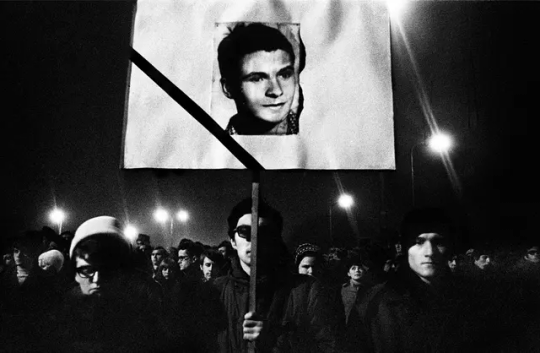
Josef Koudelka made surreptitious photos of the Soviet invasion of Czechoslovakia in 1968, which were smuggled out of the country. This image from January 1969 is of a public mourning of the death of Jan Palach, a 21-year-old student who set himself on fire in the center of Prague. It is crushing af to see this now in the wake of Aaron Bushnell's own self-immolation, in my country, not far from my house.
image: josef koudelka/magnum via newyorker.com
42 notes
·
View notes
Text

#masha gessen#zombie#società#società malata#violenza#gaza#guerra#propaganda#bambini#genocidio#schiavi#dittatura#politica#diavoli#svegliatevi#aprite gli occhi#sistema#matrix#responsabilità#verità
14 notes
·
View notes
Text
by Phyllis Chesler
Both Butler and Gessen seem to revere Jewish vulnerability, statelessness and martyrdom. Are they also Nazis in drag?
The two conformists see Jewish vulnerability to persecution as far more “ethical” than the Jews’ ability to defend themselves from persecution and genocide. According to Prof. Corinne Blackmer in her brave book Queering Anti-Zionism: Academic Freedom, LGBTQ Intellectuals and Israel/Palestine Campus Activism:
“Butler implicitly argues that Jews were better off suffering rather than perpetrating state-sponsored persecution. … Two possible lessons or conclusions can be drawn from the fact that Jews experienced considerable state-sponsored violence, persecution and discrimination in the galut [exile], culminating not only in the Holocaust but also the forced removal of nearly one million Mizrachi Jews from their ancestral homes in the Middle East before or during the establishment of Israel as a Jewish state in 1948. One, supported by Butler and other BDS advocates, states that precisely because Jews suffered extreme state-sponsored violence, they should endeavor to avoid state-building, although this formulation leaves unanswered precisely under what political system Jews should (peacefully?) reside.”
In her piece in The London Review of Books, Butler does “condemn without qualification the violence committed by Hamas. This was a terrifying and revolting massacre. This was my primary reaction, and it endures.”
However, she then goes on to “contextualize” this statement by trotting out all manner of false allegations against Israel: “We should develop some understanding of why groups like Hamas gained strength in light of the broken promises of Oslo and the ‘state of death, both slow and sudden’ that describes the lived existence of many Palestinians living under occupation, whether the constant surveillance and threat of administrative detention without due process or the intensifying siege that denies Gazans medication, food and water.”
Butler appears to be either ignorant of or deliberately concealing several important facts: Israel left Gaza in 2005. Hamas—an Iranian-funded Islamist terror group—controls, indoctrinates, tortures, torments and impoverishes Gazans. Hamas has taken the lion’s share of the aid meant for Gaza civilians and diverted it into their own bank accounts abroad and into building their terror tunnels and weaponry. No Arab country has been willing to offer Gazans refuge, even temporarily. Egypt has walled off Gaza from the Sinai. Hamas has increasingly forced women to wear veils, marry into polygamous families and risk being honor-killed if they “shame” their families.
14 notes
·
View notes
Text

Alexey Nalvalny’s birthday message to his wife, Yulia, in July 2023. (As recounted by Masha Gessen in the New Yorker today 2/16/2024.)
9 notes
·
View notes
Text
Art, Culture, Censorship, and Palestine
I'm late in posting this, but from Democracy Now, interviews with three important cultural workers, an artist and two writers, who are being censored. Samia Halaby, Marione Ingram, and Masha Gessen.
youtube
"We spend the hour looking at how artists, writers and other cultural workers in the United States and Europe are facing a growing backlash after expressing solidarity for Palestine. We begin with one of these "canceled" cultural workers: renowned Palestinian American artist Samia Halaby, whose first U.S. retrospective was canceled by her graduate alma mater, Indiana University, after she criticized Israel's bombardment of Gaza. The school’s provost said this week the show would have been a "lightning rod" that carried a "risk of violence." Halaby expresses her shock and disappointment at the betrayal of "academic freedom" evidenced by the decision. "The administration has lost sight of their responsibility to the community, to the students that are there," she says, and adds, "This is much larger than I am," citing the suppression of pro-Palestine student activism around the country and calling it "a kind of attempt at mind control.""
youtube
"We are joined by 88-year-old Jewish German American Marione Ingram, who describes how her scheduled speaking tour in Hamburg -- the city she fled in the Holocaust -- was "postponed" this month amid a wider backlash against those speaking out against Israel's assault on Gaza. Ingram has been protesting for months outside the White House calling for a ceasefire, and characterizes U.S. and German pro-Israel policy as "disturbing" and "frightening." As a survivor of the Holocaust, Ingram says, "My childhood was spent in the first 10 years much the same way as the children of Gaza. I know exactly what they're going through. I know exactly how they're feeling." She argues "it should be an absolute standstill of all governments that you are told over 10,000 children are being murdered. There is no excuse for that.""
youtube
"We speak with the acclaimed Russian American writer Masha Gessen, whose latest article for The New Yorker looks at the politics of Holocaust commemoration in Europe. Gessen was scheduled to receive the prestigious Hannah Arendt Prize in Germany on December 15, but the ceremony was postponed after some award sponsors withdrew support over Gessen's comparison in the article of Gaza to the Warsaw Ghetto. A smaller award ceremony is set for Saturday. Gessen says Germany's culture of learning about and atoning for the sins of the Nazi regime has morphed into steadfast support for the state of Israel despite its actions, while banning most forms of pro-Palestinian solidarity as part of a flawed effort to fight antisemitism. The cornerstone of this form of "memory politics" is that "you can't compare the Holocaust to anything," says Gessen. "My argument is that in order to learn from history, we have to compare.""
#Youtube#palestine#ceasefire#strike for palestine#censorship#samia halaby#marione ingram#masha gessen#never again#gaza#holocaust remembrance#art#writing#culture#history
9 notes
·
View notes
Text
The Politics of Memory
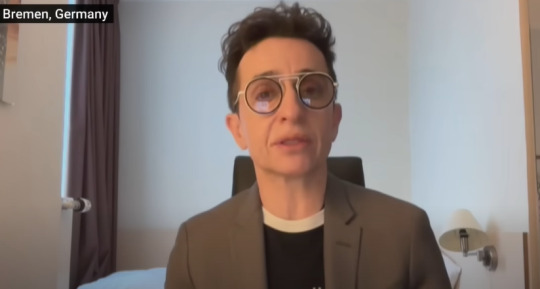
“The way memory politics functions in Europe, in the United States, but especially in Germany, the cornerstone is that the Holocaust was a singular event, standing outside of history. My argument is that in order to learn from history, we have to compare. That actually has to be a constant exercise. We are not smarter people, better people, or more educated people than the people who lived ninety years ago. The only thing that makes us different from those people is that in their imagination the Holocaust did not yet exist. In ours it does. We know that it’s possible. And the way to prevent it is to be vigilant in the way Hannah Arendt did in fact and other Jewish thinkers who survived the Holocaust. There was an entire conversation in the first two decades after World War Two in which they really talked about how to recognize the signs of sliding into the darkness. Our entire framework of international humanitarian law, it comes out of the Holocaust as does the concept of genocide. And I argue that that framework is based on the assumption that you are always looking at war, at conflict, at violence through the prism of the Holocaust. You always have to be asking the question of whether crimes against humanity, the definitions of which came out of the Holocaust, are occurring. Israel has waged an incredibly successful campaign of not only setting the Holocaust outside of history, but setting itself aside from the optics of international humanitarian law by weaponizing the politics of memory and the politics of the Holocaust.”
Masha Gessen, in an Interview on Democracy Now, 16 Dec 2023
#politics#hannah arendt#masha gessen#germany#holocaust#memory#israel#never forget#history#time#palestine#genocide#ghetto#liquidation#gaza#warsaw
10 notes
·
View notes
Text
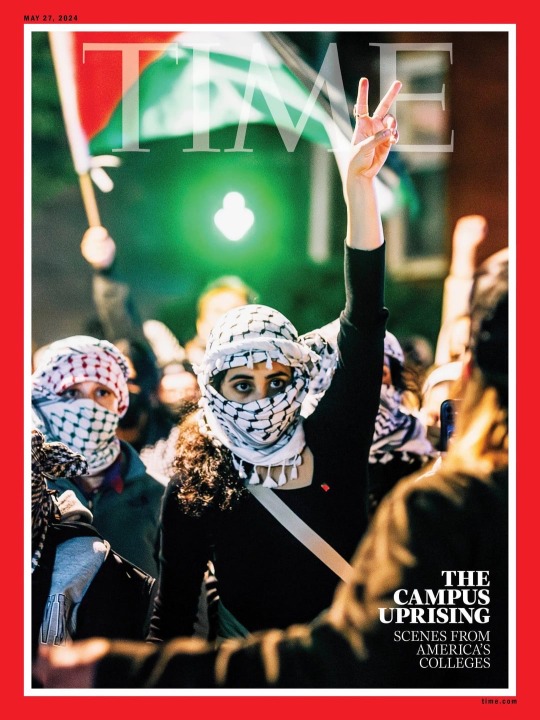
“I'm observing such a huge gap between different social groups that I didn't even realize were different. I, you know, most of my friends are in the media. A lot of my journalist friends are just much better informed.
A lot of them have had experience reporting in Israel, Palestine, and are quite critical of both Israel and the antisemitism narrative. Then, like, my wife is a lawyer, and her circle is a little bit different, right? It's not dominated by media people, like people in the law or in other professions seem to be broadly much more kind of taken by the sense of profound insecurity and shift in the American Jewish experience.
I think we sort of see different things, for example, when we watch the hearings in Congress on antisemitism on campus.
The university presidents, of which there have now been two hearings, one with three presidents, one with the president of Colombia, and there will be many, many more. And what I see is a right-wing campaign against higher education that is weaponizing antisemitism as an idea, right? Not antisemitism as a practice.
And what they see is, with the possible exception of the president of Colombia, is people who represent institutions or lead institutions that they feel an affinity with, often institutions that they graduated from, who are not standing up for them. Which I find that viewing of those hearings somewhat shocking because people seem to be turning off their critical faculties. But people, intelligent, educated, politically astute people don't turn off their critical faculties unless they're scared.
So I think the underlying fear is real. But just because it's real, it doesn't mean it's justified.
I think a factual account of what we're seeing on campuses now is that this generation of Americans is far more critical of Israel than their parents' generation. And this is true of both Jews and non-Jews. I think that they look at information available to them and they see a 57-year brutal illegal occupation.
And they don't understand how it's possible that their parents and the politicians that their parents support and the politicians who come and give commencement addresses and all that other stuff that I can say about politicians, how it is possible that these people support that state? I think that is an entirely understandable view. It also reflects a huge generation gap.
I think some of those young people are assholes, and some of them are antisemites. I think it's a small minority of the protesters, and it is not actually part of the critique. The protesters' demands, the protesters' organizing beliefs are not in any way or shape antisemitic.
And then there are Jewish students who were brought up Zionist, who were brought up to identify strongly with the state of Israel, who are, I think, a little bit like my cousin in the settlements again. They see these protests, and even probably the participation of their fellow Jewish students in these protests, as threatening their core identity, as threatening their ties to their families, as threatening everything that they were taught for the first 18 years of their lives is true. And of course they feel rattled, of course they feel unsettled, of course they feel threatened.
Like, wouldn't you, if you felt that everything you had believed in was being turned on its head, and if you, by apparently reasonable people? And so you have a couple of options. One is to look at what the protestors are saying, to engage with the facts, to engage with the critique of everything you've ever believed.
There was a terrific, George Curran's podcast a couple of weeks ago with three Columbia students, one of whom sort of narrated that kind of trajectory, getting to university and finding this stuff out and having their mind blown. That's a very difficult path, and it's a very difficult path, especially if you are, say, a first year student in 23, 24.
And then there's the easier path of staying integrated in your community, in your beliefs, and saying this is antisemitic.
Because unfortunately the things that the protestors are talking about are so horrible that you can't say, okay, let's agree to disagree, that you can't hold both of these things in your mind at the same time.
You can't continue to hold your family's uncritical, long-standing support of Israel, and an understanding of what is happening in Gaza and the occupation that has preceded the war in Gaza.
So yeah, of course they feel rattled. That doesn't mean that they're being surrounded by antisemitism.”
—Masha Gessen, the descendant of Holocaust survivors, discusses campus protests (part 3 of 3)
#politics#palestine#israel#masha gessen#student protests#campus protests#columbia university#anti zionism ≠ antisemitism#weaponized antisemitism#weaponized zionism#identity politics#idpol#ethnic cleansing#genocide#israel is a terrorist state#israel is an apartheid state#gaza#rafah#antisemitism#islamophobia#🇵🇸#college protests
530 notes
·
View notes
Text
Highly recommend this essay on the politics of memory, the Holocaust, and the conflict in Israel and Palestine. It’s from the New Yorker and behind a paywall so I can’t share publicly but feel free to msg me and I’ll, er, see what I can do. Legally, of course. 😇

7 notes
·
View notes
Text
There is an arrest warrant for Vladimir Putin by the International Criminal Court (ICC) for his genocide in Ukraine.
In limp retaliation, Russia has placed the judges of the ICC and journalists who have reported Russian war crimes on its own wanted list.
A journalist recently added to that list is Russian-American Masha Gessen.
Russia's Interior Ministry has added Russian-American journalist, writer, and outspoken Kremlin critic Masha Gessen to its wanted list. Gessen's name appeared on the ministry's list on December 8 without specifying what the journalist is wanted for. Media reports said earlier that a probe against Gessen was launched in late August on a charge of distributing "fake" information about Russia's armed forces. The charge stemmed from Gessen's interview with Russian journalist Yury Dud about alleged atrocities committed by Russian troops against civilians in Ukraine, the reports said.
In Russia these days, distributing "fake" information about Russia's armed forces actually means the opposite – reporting war crimes and genocide.
In 2017, Masha Gessen took part in a PBS Frontline series called "The Putin Files". Here is the extended version of Ms. Gessen's interview by Michael Kirk.
youtube
Here's an article at Literary Hub featuring an excerpt from Gessen's book The Man Without a Face: The Unlikely Rise of Vladimir Putin.
"A Small, Vengeful Man:" How Vladimir Putin Began His Iron-Fisted Reign
Masha Gessen Chronicles the Early Days of Putinism in Russia
#invasion of ukraine#vladimir putin#journalism#putin's attempts to control the media#genocide#putin is a war criminal#international criminal court#masha gessen#stand with ukraine#подавление свободной прессы#журналистика#маша гессен#россия#владимир путин#путин хуйло#международный уголовный суд#путин - военный преступник#союз постсоветских клептократических ватников#руки прочь от украины!#геть з україни#вторгнення оркостану в україну#деокупація#україна переможе#слава україні!#героям слава!
10 notes
·
View notes
Text
"The biggest difference between Gaza and the Jewish ghettos in Nazi-occupied Europe is that most Gazans are still alive and the world still has an opportunity to do something about it."
-Masha Gessen
6 notes
·
View notes
Text
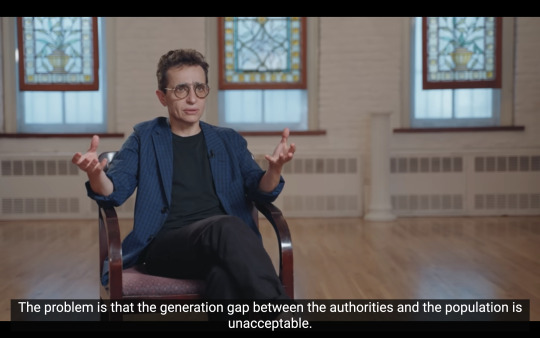

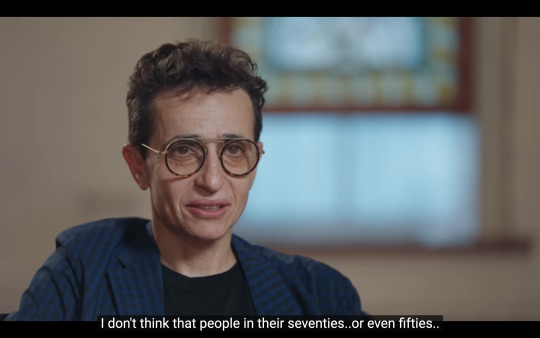


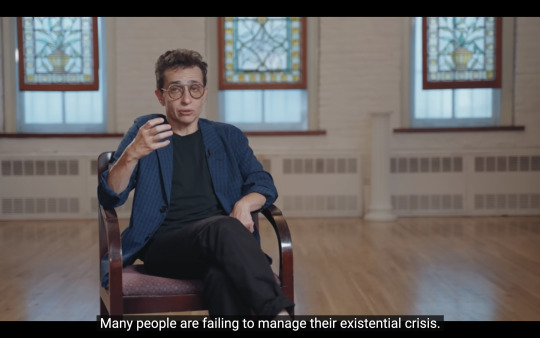



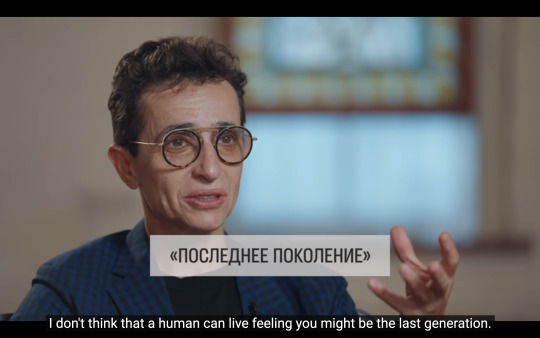
Masha Gessen in an interview with Yuri Dud
#masha gessen#climate change#yuri dud#вДудь#vdud#i've watched this part of the interview last night and finished it in its entirety just now#but i am still stuck on this small segment (which the link leads to)#they perfectly put how i feel and why#the existential horror and feeling that this is it#that i am going to be here for the final days#and seeing people around me go on with their lives as if people my age weren't facing down global collapse in our lifetime#i wouldn't be this worried at least not for myself if i were 50#20 more years is gonna be umcomfortable but probably doable#but 50? i don't want to be around for that#and that is just thinking of the climate crisis from my very lucky and privileged place of residence#i look at those younger than me and those still being born and i feel like screaming and crying#which is where my antinatalism comes in but how on earth are can anyone around#and consciously (while well aware of the crisis we are already experiencing) decide to reproduce condemning their children#it's like inside of me is one neverending scream of existential terror
10 notes
·
View notes